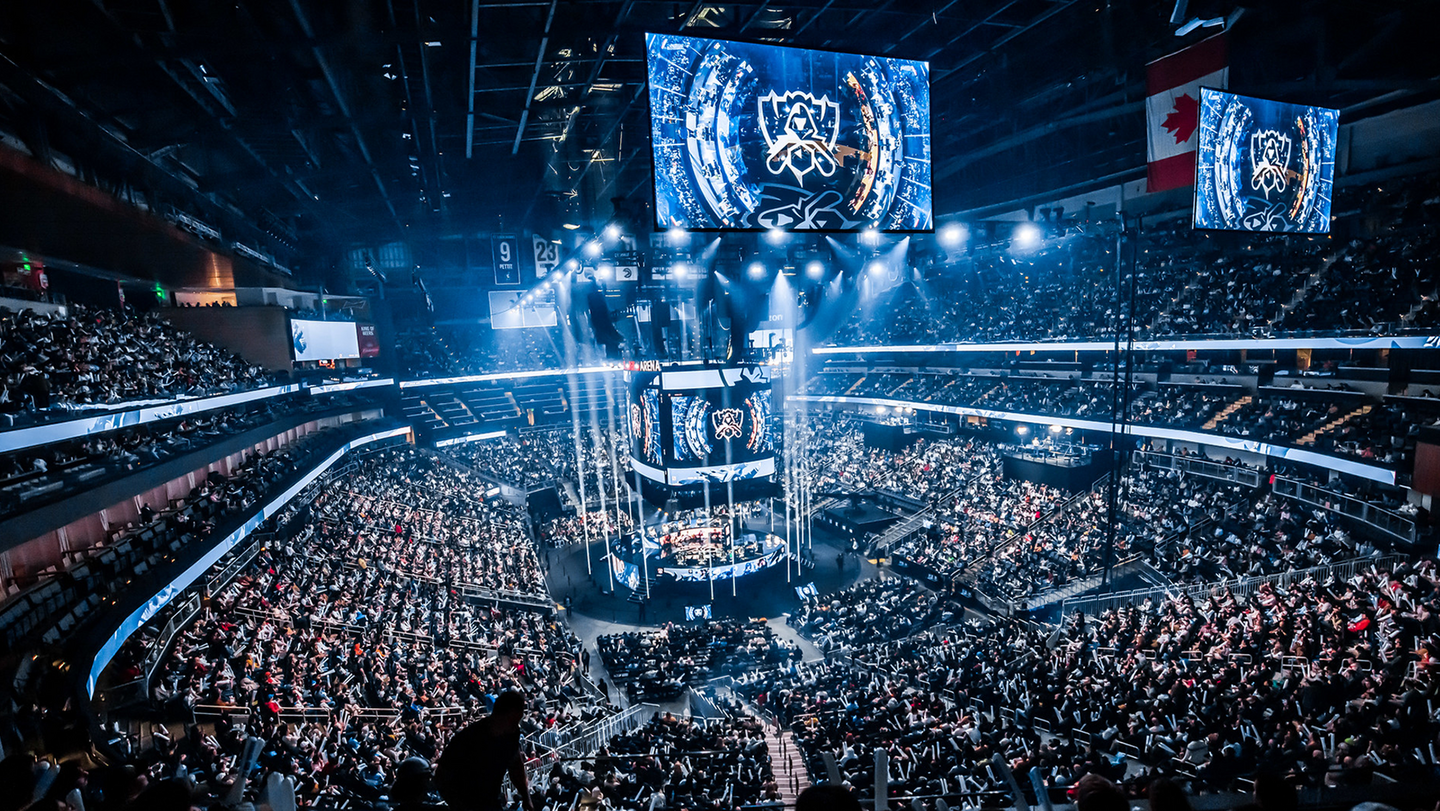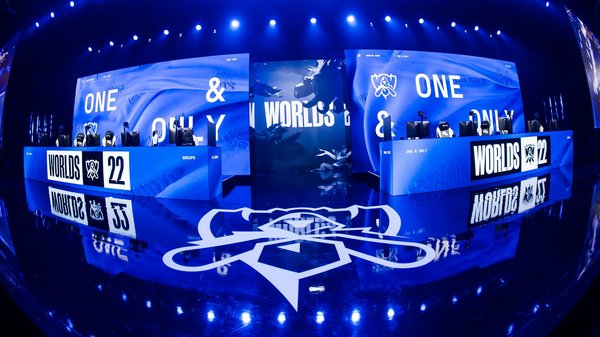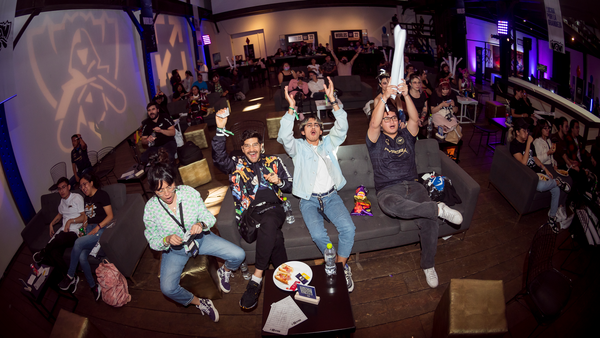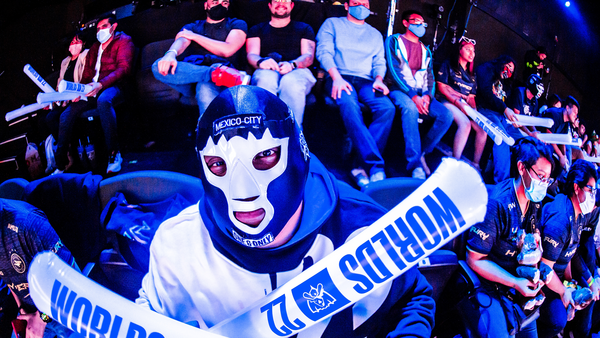As Lil Nas X and Jackson Wang prepare to perform before the Worlds 2022 finals in San Francisco, the esports team at Riot is readying their finale after a year of action-packed esports events. Over the years, Worlds has traveled to some of the most famous stadiums in the world. It’s been played in Beijing's Bird Nest, New York’s Madison Square Garden, and Seoul’s World Cup Stadium. In 2022, the biggest esports event in the world returns home to North America for the first time since 2016.
“This is my ninth Worlds now and what drew me to Riot was seeing Worlds in the Staples Center in 2013 as a fan,” said Sam Chaimson, Manager of Live Broadcast Production on Worlds. “I remember being in awe of the investment Riot was making in esports. It wasn’t just a marketing gag to promote the game, it was validation of being a gamer and being passionate about League of Legends.”
Since 2013, gaming has found itself entrenched in the mainstream of popular culture. As Worlds has grown over the years, more and more people find themselves tuning in to the month-long tournament every fall. In 2021, over 70 million people watched the finals. One of the best ways to put this in perspective, though, is with a metric called average minute audience, which is how TV ratings are measured by groups such as Nielsen. To put this in perspective, the most recent NBA Finals and World Series have had an average minute audience of about 12 million viewers. Worlds finals in 2021 clocked in at 30 million.
“Every year, there’s something new at Worlds,” Sam continued. “My first Worlds working for Riot was 2014. We had Imagine Dragons perform in Seoul’s World Cup stadium and I remember thinking, ‘and I thought Staples Center was big.’ That one blew my mind. In 2017, we went to Beijing and made an augmented reality (AR) dragon that flew around The Birds Nest. In 2018, we had K/DA, the K-pop band we created perform for the first time. For 2020, when we had to pivot because of Covid, we ended up leaning heavily into AR to create a set that transported the players to different places like an airy skyscraper roof for our cloud stage and a brutalist concrete monolith for our mountain stage.”
In 2022, Worlds is put on by a combination of longtime Rioters and new ones who have joined the company combining their talents and backgrounds in film, TV, traditional sports, music, live entertainment, and so much more.
“What first drew me to Riot was actually a piece from HBO Real Sports that followed the 2013 Worlds which showed the community and the merging of different worlds happening in esports,” said Dave Stewart, VP of Esports Content Services, who previously worked at both Fox Sports and Time Warner as a producer before joining Riot. “Esports is this cross-section of sports, entertainment, art, music, and storytelling that I found really appealing. Even now, nine years since I joined, we get candidates with really diverse backgrounds because it takes so many crafts to make Worlds a reality.”
If any of this sounds interesting to you, well, we’re hiring. As of writing, there are currently around 40 open roles on the esports team alone–and 400 within Riot as a whole–that we are looking to fill with plenty of opportunities to join the group of Rioters who come together to help make Worlds a reality every year.
“I definitely was well aware of Riot but I’m not a League player myself,” said Ashley Gomez who worked in traditional sports, music, and entertainment before joining Riot’s Business Development and Corporate Partnerships team in 2022. “Esports is the perfect intersection of all the industries I’ve worked in. There are elements of all of them and also similarities for my role which made the transition easier as you still have the in-stadium signage, you still have your broadcast assets, and you’re still working with partners to make sure everything works well.”
People come to Riot from a wide range of industries. On the esports team, many people trace their roots to the world of traditional sports. They come in with varying degrees of knowledge about the intricacies of League of Legends. Once you get past the initial differences of a competition happening digitally instead of physically, you reach a level of commonality between sports and esports.
“Esports has all the exhilarating moments of sports,” Dave said. “The highs of winning and the lows of defeat. There’s the empathy you feel when you see players trying to persevere and grab a win from the jaws of defeat with a risky play, even though they know it probably won’t work.”
As producers build stories for Worlds, they follow themes common across the world of competition. Battles between regions as top teams face head to head, redemption for players who came up just short, or Faker, the greatest League of Legends player of all time, going for his fourth world championship.
“Our broadcast shares a lot in common with sports,” said John Depa, Lead Broadcast Producer for the LEC who produced on-site for Worlds 2022. “We’re capturing their emotions in the thrill of victory, humanizing them in the humility of defeat. We’re showing their competitive spirit and how they reached this point. It’s the same thing you would do for football, soccer, or basketball. But the biggest difference I think is the interaction with the community. We do things like run game shows where fans vote in Discord. We have the live immediate feedback of the audience through Twitch chat. As a broadcast producer, being able to interact with the audience can be a fun and interesting way to make segments of the show really land.”
In addition to the stories, there’s the technology that brings it all to life. As you can imagine, in the world of esports, this is a pretty crucial piece of the puzzle.
“The way I view a broadcast set is that everything is Lego pieces,” said Michael Caal, Technical Broadcast Manager, who previously worked for Univision and the X Games before coming to Riot in 2015. “You have your cameras and your switcher, those are standard pieces. But then you start introducing the more complex pieces like AR and figure out how those fit in. Suddenly your Lego model blows up in size and scale. Previous places I worked, I’d maybe use half the features of the equipment we had. But the way we use technology here is pretty incredible, we push our equipment to the limit of what we can do because we constantly want to try new things.”
Over the past few Worlds, AR has become a common theme. The Elder Dragon in the Birds Nest won the broadcast team a Sports Emmy beating out other nominees like March Madness and the NBA Finals. In 2019, True Damage, a rap group put together for that year’s Worlds anthem, performed a concert. With the pandemic shifting plans in 2020, the entire stage was driven by AR.
“When I talk to people in broadcast roles who are curious about esports, I tell them they are going to learn a lot,” said Michael. “You’ll get to work with cutting-edge technology. If you work in traditional broadcasting you might not have the budget or the chain of command to test things. But here testing new tech is pretty easy. And I love the team, you get to work with some really smart people, everyone knows what they are doing. So discussions about the broadcast are really in-depth, efficient, and a bit refreshing compared to my experiences on other broadcasts.”
Worlds has happened every year for the last decade. It’s the biggest event in esports and the aspirations for decades to come only become loftier as broadcasts build upon themselves and try new things. With that being said, Worlds is still young in the grand scheme of things. Events like The World Cup and The Oscars have nearly a century of history.
“It may not be the ground floor for esports but we’re still on the second floor, the mezzanine level here,” said Eamon Frasher, Live Broadcast Producer for the LCS and International Events. “Esports is going to be a driving force in gaming and entertainment for decades to come. We have triumph, we have heartbreak, we have players giving it their all for a chance at greatness. And if you’re sleeping on esports because you don’t think it’s that interesting, well, I’m sorry, but you’re flat-out wrong.”
So if you’re sleeping on esports or just waking up, here’s an espresso shot to get you going. We have esports jobs around the world based in our Los Angeles, Seattle, Berlin, Singapore, Seoul, and Tokyo offices. There are Travel Broadcast Engineer and Travel Network Engineer roles working out of our new Stryker facility in Seattle, a Principle Insights Analyst working out of Los Angeles, Production and Project Manager roles in Berlin, and a range of content and competitive operations roles in Seoul.
Check out all of our esports jobs in one place and, while you’re at it, widen the scope out to 400 roles across all of Riot with openings in 17 different offices around the world.



